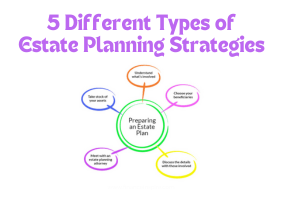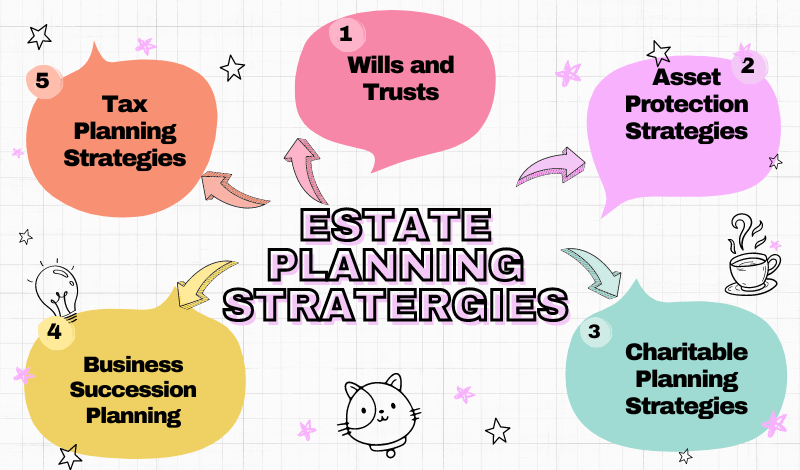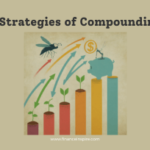Safeguarding Your Legacy: 5 Different Types of Estate Planning Strategies Explored
Estate planning is a crucial process that involves developing strategies to protect and distribute your assets according to your wishes after you pass away. With a variety of options available, it’s essential to understand the 5 Different Types of Estate Planning Strategies to ensure your legacy is preserved and your loved ones are provided for. This comprehensive guide will explore the various estate planning strategies, their benefits, and their potential applications.
1. Wills and Trusts: 5 Different Types of Estate Planning Strategies
Wills and trusts are fundamental components of the 5 Different Types of Estate Planning Strategies and are often used in tandem to achieve specific goals.
Wills
A will is a legal document that outlines how you want your assets to be distributed after your death, and is one of the 5 Different Types of Estate Planning Strategies. It allows you to name beneficiaries, appoint guardians for minor children, and designate an executor to oversee the administration of your estate.
Trusts
A trust is one of the 5 Different Types of Estate Planning Strategies, a legal arrangement in which a third party (trustee) holds and manages assets on behalf of one or more beneficiaries. There are various types of trusts, including revocable living trusts, irrevocable trusts, and testamentary trusts, each serving different purposes.
2. Asset Protection Strategies:
Asset protection strategies, one of the 5 Different Types of Estate Planning Strategies, are designed to safeguard your assets from potential creditors, lawsuits, or other legal claims.
Domestic Asset Protection Trusts (DAPTs)
Domestic Asset Protection Trusts (DAPTs), one of the 5 Different Types of Estate Planning Strategies, are irrevocable trusts that can shield assets from future creditors while allowing the trust creator to retain some control over the assets. These trusts are available in certain states and can be an effective tool for high-net-worth individuals or those in high-risk professions.
Limited Liability Companies (LLCs)
Limited Liability Companies (LLCs), one of the 5 Different Types of Estate Planning Strategies, can provide liability protection for assets held within the LLC structure. By separating personal and business assets, LLCs can help shield your personal assets from potential legal claims or liabilities related to your business activities.
3. Charitable Planning Strategies:
Charitable planning strategies, one of the 5 Different Types of Estate Planning Strategies, allow you to support causes or organizations that are important to you while potentially providing tax benefits.
Charitable Trusts
Charitable trusts, such as Charitable Remainder Trusts (CRTs) and Charitable Lead Trusts (CLTs), are one of the 5 Different Types of Estate Planning Strategies that enable you to transfer assets to a trust that provides income to beneficiaries for a specified period, with the remaining assets eventually going to a designated charity.
Donor-Advised Funds
Donor-Advised Funds (DAFs), one of the 5 Different Types of Estate Planning Strategies, are charitable investment accounts that allow you to make tax-deductible contributions and recommend grants to qualified charitable organizations over time. These funds offer flexibility and potential tax advantages for charitable giving.
4. Business Succession Planning:
Business owners must consider strategies for transitioning ownership and management of their businesses as one of the 5 Different Types of Estate Planning Strategies, to ensure continuity and minimize disruptions.
Buy-Sell Agreements
Buy-Sell Agreements, one of the 5 Different Types of Estate Planning Strategies, are legal contracts that outline the terms and conditions for transferring ownership interests in a business to another party, such as a co-owner or key employee, in the event of the owner’s death, disability, or retirement.
Family Limited Partnerships (FLPs)
Family Limited Partnerships (FLPs), one of the 5 Different Types of Estate Planning Strategies, are a type of partnership structure that allows business owners to transfer ownership interests to family members while retaining control over the management and operations of the business. FLPs can provide asset protection and potential tax benefits.
5. Tax Planning Strategies:
Tax planning strategies, one of the 5 Different Types of Estate Planning Strategies, are designed to minimize the tax implications of transferring assets to beneficiaries and preserving wealth for future generations.
Irrevocable Life Insurance Trusts (ILITs)
Irrevocable Life Insurance Trusts (ILITs), one of the 5 Different Types of Estate Planning Strategies, are trusts that hold life insurance policies, allowing the death benefit to be paid to the trust and distributed to beneficiaries free of estate taxes.
Grantor Retained Annuity Trusts (GRATs)
Grantor Retained Annuity Trusts (GRATs), one of the 5 Different Types of Estate Planning Strategies, are irrevocable trusts that allow you to transfer assets to beneficiaries with minimal gift or estate tax consequences, provided certain conditions are met.
Qualified Personal Residence Trusts (QPRTs)
Qualified Personal Residence Trusts (QPRTs), one of the 5 Different Types of Estate Planning Strategies, are irrevocable trusts that allow you to transfer ownership of your primary residence or vacation home to beneficiaries while retaining the right to live in the property for a specified period, potentially reducing gift or estate taxes.
Estate planning is a multifaceted process that requires careful consideration of your unique circumstances, goals, and preferences. By understanding the 5 Different Types of Estate Planning Strategies available, you can work with qualified professionals to develop a comprehensive plan that protects your assets, minimizes tax liabilities, and ensures your legacy is preserved for future generations.
It’s important to note that estate planning laws and regulations can vary by state and may change over time, so it’s essential to regularly review and update your 5 Different Types of Estate Planning Strategies and overall estate plan to ensure it remains aligned with your objectives and compliant with current regulations.











